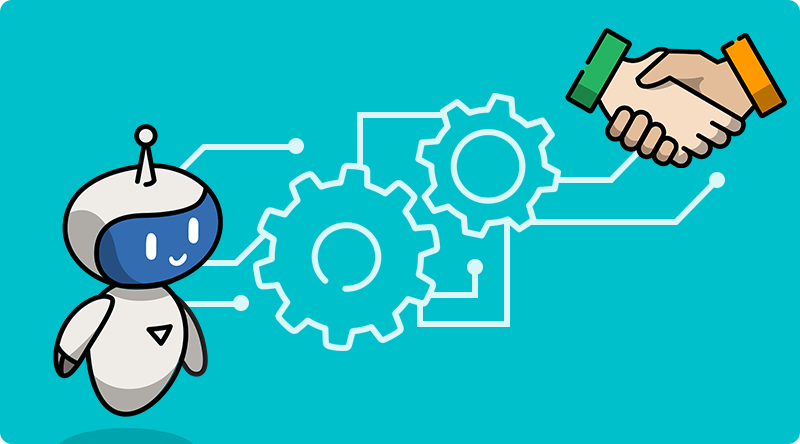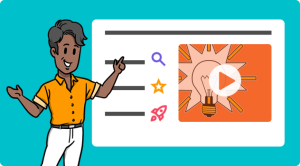Top sales challenges & how AI can power your sales enablement strategy
Written by Natasha Merchant | 31st July 2024

Everyone is talking about sales enablement – and for good reason! A standard approach to selling your products or services will not work in 2024.
Let’s take a look at an example:
Has this ever happened to any of your sales reps?
Sales rep: “Hello, sir, I am calling to inquire whether you want to…?”
*click*
The person cuts the phone without even listening to the complete sentence!
There could be multiple reasons (for example, trying to connect with a lead that’s not a lead!).
However, one thing is clear – equipping your sales team with the right strategies, insights, and tools is crucial. This empowerment can help them engage customers effectively and close deals faster.
But let’s be honest—this comes with some big challenges. In this blog, we’ll cover challenges, how AI helps overcome them, and how AI can empower your sales enablement strategy. Let’s get started!
What is a sales enablement strategy?
Sales enablement is exactly as it sounds—it’s about providing sales representatives with the right knowledge, skills, resources, and processes to connect with and convert potential buyers.
Sales enablement includes:
- Comprehensive training in selling techniques, messaging, products, services, etc.
- Various sales tools and informative content, such as battle cards, presentations, etc.
- Analytical data that helps measure team performance and optimize sales strategies
The goal?
Instead of leaving sales reps out to dry and asking themselves, “What do we do now?” sales enablement helps ensure they know what to say at every step of the sales cycle to deliver excellent customer service.
Now that we understand how a sales enablement strategy works, let’s discuss three key challenges every sales team faces.

3 key challenges every sales team faces (and how AI can overcome them)
Challenge #1. Qualifying and prioritizing leads
Every sales rep gets a long list of prospects, i.e., potential buyers. Going through the list, identifying high-quality leads, and understanding which ones to prioritize is time-consuming and sometimes inaccurate.
How can AI help here?
AI makes analyzing vast amounts of data easy and smooth. It can prioritize and score leads based on their conversion likelihood, empowering sales teams to focus on the most promising prospects.
Let’s take Hubspot as an example. Their Sales Hub offers a leads tool, ensuring efficient and streamlined lead management. The tool enables lead pipeline automation , thereby keeping managers updated with up-to-date information.
Additionally, the package also enables sales teams to prioritize leads – permitting teams to plan their next step, and update past meeting outcomes.
Challenge #2: Understanding customers
Interesting fact: Globally, more than 950 Forrester survey respondents revealed significant changes in buying behavior.
Not only do customers’ needs and wants change significantly over time, but every customer is different. Understanding a user’s specific needs and personalizing your sales pitch to ensure effectiveness requires extensive research—which is, again, time-consuming and difficult!
For example, let’s say two people are searching online for a sales tool. One can do it all – generate leads and earn big bucks but finds it extremely hard to keep track of the money trail. Therefore, in the long run, it’s impossible for this person to analyze or set a target.
The second one? Is a newbie. The team gets leads but needs a tool to streamline the process – especially ensuring they don’t miss connecting with leads. The main issue for this person is that they miss out on leads.
Here, we have two people wanting the same tool but for very different reasons. That’s why understanding your customers’ intent is crucial.
How can AI help here?
With effective customer data analytics, AI tools can uncover potential customers’ insights and preferences. With this information, sales teams can personalize the pitch and offers according to customers, enhancing engagement and conversion rates.
Segment is one such AI tool that enables sales teams to activate highly personalized customer experiences by leveraging real-time data. The information allows teams to:
- Make data-driven, intelligent decisions
- Provide consistent messaging across all channels
- Quickly craft excellent omnichannel interactions
Challenge #3: Acquiring the needed knowledge and skill
As the market changes rapidly, ensuring sales reps acquire the required skills to perform efficiently and effectively is a constant hurdle. This is because training has always been a top challenge for sales teams.
Whether it’s upskilling the existing staff or getting new hires up to speed, the process needs to be more streamlined to address potential customers in a personalized manner. It’s usually a one-size-fits-all approach – and that never works!
How can AI help here?
AI tools offer practical, informative, and comprehensive training programs. They enable sales teams to track performance and suggest areas for improvement, ensuring that sales reps develop their skills constantly and stay up-to-date with industry trends. One example of this would be using the AI-powered simpleshow platform to create engaging communication. Using the platform, sales teams can create engaging training videos in minutes – even without tech skills.

How can AI empower your sales enablement strategy?
In today’s fast-changing world, sales teams leverage AI tools to streamline various sales enablement tasks. This section covers a few use cases.
1. Analyze sales calls with conversational intelligence
Sales reps talk to potential customers every day. But it’s essential to call a customer and convert them into a buyer, so it’s a good practice for sales reps to take notes. However, taking notes during calls can lead to a shift in focus, while taking notes after the call can lead to inaccuracy.
Once a sales rep takes notes, they waste significant time analyzing them and reaching conclusions—understanding how to level up the sales game.
An AI-powered contact center enables businesses to record and transcript calls so that sales reps can:
- Be fully present on the sales call at the moment
- Analyze calls whenever, wherever required for self-coaching tips
- The tool also enables sales reps to craft personalized follow-up communication strategies, ultimately improving their likelihood of closing a deal.
Some AI tools also score your sales call, helping sales managers quickly identify when to step in and provide training to improve outcomes.
A good example here is Salesloft. The tool helps teams work better by leveraging AI to transcribe, analyze, and summarize every conversation. The conversation can then be accessed and analyzed later to understand what went wrong and how to improve.
2. Deliver sales content that resonates with every customer!
Content is crucial for sales pitches. What you say to a customer keeps them engaged. Therefore, sales reps must quickly find and share content that resonates with each buyer.
But it’s complicated (and time-consuming) for reps to determine what content will work and then find it. Incorporating AI in sales enablement makes it a whole lot easier.
AI carefully and comprehensively analyzes various factors, including the buyer’s purchase signals, and considers the success of content used by other reps in similar sales scenarios. This precision empowers sales reps to confidently recommend content that will resonate with a specific buyer, freeing up their time to focus on delivering value and engaging with the buyer.
For example, Highspot enables sales teams with a single source of truth—from training to sales to other knowledgeable resources, sales teams can access all content from one place, helping them be proactive and face any challenge head-on.
3. Improve and ensure accurate sales forecasting
The Chief Revenue Officer + Sales Leader Outlook Report stated that 34% of sales companies view inaccurate forecasts and limited predictability as one of their top challenges.
Predicting your company’s revenue is crucial, but creating an accurate sales forecast is equally challenging.
AI can bring significant benefits in sales forecasting. It can help sales teams analyze sales activities, provide insights into each deal, and identify at-risk deals. With this information, sales teams can gain insight into how many deals will likely close, making it easier for them to forecast sales.
A great example here is the Salesforce Einstein Analytics tool. The tool offers features like:
- Custom forecast pages to ensure adaptable forecasting with respect to your unique sales process
- Built-in charts to visualize sales forecasts and their performance to make data-driven decisions
- Real-time management to accurately predict the likelihood of winning a sales opportunity
4. Analyzing Sales Metrics and Progress
AI can help with analyzing your sales metrics and progress by offering deep insights into several crucial metrics.
For example, Zoho Analytics comes with a customizable dashboard wherein teams can choose what metrics they want to immediately access. Here, the below dashboard shows a few metrics that’s important for a sales team.
That being said, a few more key sales metrics include:
- Customer Lifetime Value (CLV): AI tracks a customer’s total worth over their relationship with the company, helping to prioritize high-value customers.
- Customer Acquisition Cost (CAC): AI monitors the cost of acquiring new customers to ensure that it remains sustainable and within budget.
- Sales Conversion Rates: AI analyzes the efficiency of your sales funnel, helping to understand how well leads are being converted into customers.
- ROAS (Return on Ad Spend): AI helps measure the return on ad spend, which means revenue generated for every dollar spent on advertising, providing a clear picture of campaign effectiveness.
- Average Deal Size: AI identifies trends in purchase behaviors by analyzing the average size of deals closed, helping to optimize pricing and sales strategies.
- Sales Cycle Length: AI determines how long it takes to close deals, providing insights into the efficiency of your sales process and identifying areas for improvement.
By continuously monitoring and analyzing these metrics, AI helps businesses make data-driven decisions to optimize their sales strategies and improve overall performance.
Wrapping up!
Sales is a cutthroat business, and it takes a lot of work to stand out. From qualifying leads to accurate sales forecasts, sales teams must deliver personalized pitches to their customers while ensuring efficient time management. It’s tough!
The harder it gets, the more demotivated a sales rep feels about meeting their targets.
- Enhance lead scoring
- Enable advanced sales forecasting
- Ensure personalized customer interactions
- Automate administrative tasks
- Offer intelligent training programs
With the power to analyze large amounts of data while providing insightful information, sales teams can improve their pitches and ensure higher sales, resulting in more revenue for their company.
Author's bio

Natasha Merchant:
natasha@saasbuy.com
I specialize in content marketing & I have been doing it for more than 6 years. I love creating content marketing maps for businesses. I have written content for various publication websites.
At present, I am helping SaaS to improve online visibility with the help of SEO, Content Marketing & Link Building.


